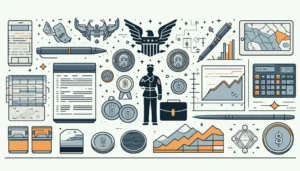Brian Feroldi’s Book Releases Today
We’ve been excited for months about the preorder for Brian Feroldi’s book, “Why Does The Stock Market Go Up?: Everything You Should Have Been Taught About Investing In School, But Weren’t.”
Well, good news is, as of today, this is a preorder no more because today is the official release of the book and it’s available everywhere books are sold!
Simply put, this book is incredible. I think it vaults instantly into the top tier of essential personal finance books, and is a must-read for anyone who wants to, among other things, understand the stock market, what it means to invest in stocks, how to consider how stocks are valued and why the stock market goes up (and down).
Here is a link to purchase ‘Why Does the Stock Market Go Up?” on Amazon.
Impact of Rising Interest Rates
One of the more unusual thoughts I hold about personal finance is this:
Our homes don’t have a specific inherent value.
What I mean by that is this: Since most people finance 80% to 99% of their home purchase price through a mortgage, the actual market value of the home isn’t the only, or even the major, determining factor in whether one can afford a new home.
What truly matters is the monthly payment.
Can you afford the payment? If so, most people don’t really care what the actual sticker price of the home is.
There are 3 major factors when calculating the Principal & Interest (P&I) portion of the mortgage payment (excluding property taxes and insurance):
1) Length of term
2) interest rate
3) amount financed
Changing any one of these 3 will impact the monthly payment when you run it through a mortgage calculator.
An extreme example:
A 30-year loan for the full purchase price of a $300,000 home at 4% interest leads to a P&I payment of $1,432
Let’s change one variable and hypothetically say rules go into place where a 10-year mortgage was the longest possible term, so now we’re looking at a 10-year loan for $300,000 at 4% interest. The monthly payment jumps to an astonishing: $3,037.
Do you still think that home is “worth” $300,000?
Or is it more like $142,000 that would produce a similar monthly payment to the original $1,432?
A current example:
Interest rates have jumped dramatically this past month and are hovering around 5% on a 30-year loan.
Contrast this with the 3.375% interest rate on a 30-year loan we refinanced into about 2 years ago.
A $300,000 loan that would have produced a $1,326 monthly payment at 3.375% interest would now look like a $1,620 monthly payment at 5%.
To get back down to the original $1,326 monthly payment, you would only be able to get a mortgage for $247,000 at 5% interest.
That’s a whopping $53,000 drop, which most likely comes from a drop in the market value of the home.
If we assume that most people max out their monthly mortgage payment into the most expensive they can ‘afford’ then a sharp and sudden increase in the interest rate would, in the absence of other factors, reduce the market value of homes.
I never think in terms of doom and gloom, nor like to prognosticate since markets are so dynamic and multifactorial, but this is something I’m watching closely over the coming months.
I wanted to pass along this somewhat unusual line of thinking, because I think it illustrates how mortgages work, which is useful in and of itself, and might bear watching as the mortgage interest rate environment continues to change.
5 Stoic Lessons
Ryan Holiday, author of ‘The Obstacle is the Way’ and creator of the Daily Stoic, tweeted something that caught my eye:
“5 Stoic lessons from Seneca:
1. We suffer more in imagination than in reality
2. Associate only with people who improve you
3. The greatest remedy for anger is delay
4. Value your time more than your possessions
5. Death is not in the distant future. We are dying every day”
ChooseFI Community Taking Action This Week
- Sara said, “My 1% better is finally going part time with my job that I have been unhappy with. I have been trying to get raises with little success, and the pay was no longer sustainable for me to reach the financial goals I have set. There was also little room for growth. The only reason I kept part time was to keep our benefits (which I do have to pay a little extra for being part time) and to continue contributing to my retirement accounts which I am not yet vested with. I got push back from my boss for a while, but felt comfortable with my FU money to tell her this is what I needed and wasn’t afraid of the worst-case scenario. I was able to go part time, just 2 days a week, which allowed me to take on another similar job on the other days of the week that pays almost double my other hourly rate. Thanks to the FI community for continuing to challenge the norm and encourage this kind of creativity.”
- Rachel said, “My 1% better has been sticking to a budget for 4 months!! It is definitely a lot to learn and get used to, but we’re finally paying ourselves first, and feel so good about where our money is going. Knowledge is power and tracking has given me a renewed sense of intention for where and how we spend money as a family. Thank you guys for always focusing on the process and values! It helps keep me balanced!”
- Tracy said, “Our 1% better is closer to 50% this week! In January we switched Wi-Fi providers to bundle it with our power bill (quite common here in NZ). We got a month free which was cool and a discount off our power bill as a sign up bonus. But the connection was so bad that after only two months we are cancelling it (which we can do because no locked in contract) and going back to our old provider – who have a new deal which we now qualify for: 4 months free! Apart from the frustration of bad internet for a few weeks we’ve managed to get 5 months of free Wi-Fi overall! A saving of around $350 – not too bad :)”
- Alec said, “I have to thank you. I was listening to episode 368 over lunch today and you covered the possibility of dropping the PMI on our mortgage using the currently inflated housing prices. A lightbulb went off in my head as we are doing a moderate renovation and just had an appraisal done by our bank. I called my wife and then our lender and it sounds like we can potentially use that to drop the PMI without any added cost. Thank you thank you thank you!! That made my weekend!”
- Katie said, “My 1% better is very simple but we’ve been so pleased with it. My fiancé and I have oatmeal for breakfast almost every morning. For years we topped it with fresh fruit (bananas, strawberries, raspberries, etc.), but we were constantly frustrated with how quickly our fresh fruit spoiled. Every week we found ourselves tossing out expensive fresh fruit. Recently I decided to try switching to frozen fruit, which we add to the oats while it cooks -wow! No more food wasted and frozen fruit is cheaper than fresh! Best of all, breakfast still tastes amazing!”
- Shannon said, “For my 1% better this week, I replaced the pair of headlight assemblies on my car. One had gotten a crack and became waterlogged and kept burning out the bulbs. Sure, an auto shop could have done it better and faster, but I saved over $500 by doing it myself, learned a new skill, and got a huge sense of accomplishment!”



